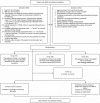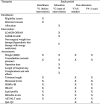The life expectancy of patients with metabolic syndrome after weight loss: study protocol for a randomized clinical trial (LIFEXPE-RT)
- PMID: 30961631
- PMCID: PMC6454761
- DOI: 10.1186/s13063-019-3304-9
The life expectancy of patients with metabolic syndrome after weight loss: study protocol for a randomized clinical trial (LIFEXPE-RT)
Erratum in
-
Correction to: The life expectancy of patients with metabolic syndrome after weight loss: study protocol for a randomized clinical trial (LIFEXPE-RT).Trials. 2019 Dec 12;20(1):716. doi: 10.1186/s13063-019-3861-y. Trials. 2019. PMID: 31831059 Free PMC article.
Abstract
Background: To date, surgeons and physicians have found positive results treating metabolic syndrome with surgical and non-surgical weight loss therapies. The purpose of this study was to evaluate changes in telomere length in patients with metabolic syndrome after weight loss.
Methods/design: This study is a three-arm randomized controlled trial. The first group is composed of patients who have undergone stapleless bypass surgery (one anastomosis gastric bypass with an obstructive stapleless pouch and anastomosis (LOAGB-OSPAN)). The second group of patients underwent standard gastric bypass surgery (laparoscopic mini-gastric bypass-one anastomosis gastric bypass (LMGB-OAGB). The patients in the third group received non-surgical weight loss therapy, including a hypocaloric diet with energy restriction (- 500 kcal/day). The aim is to compare changes-telomere length, body mass index, comorbidities, and quality of life-in patients with metabolic syndrome after weight loss.
Discussion: To the best of our knowledge, this is the first randomized study to simultaneously compare the effects of surgical and non-surgical weight loss on changes in telomere length. It could provide a solution to the growing problem of metabolic syndrome. Normalization of the body mass index results in improvements in the health of patients with metabolic syndrome.
Trial registration: ClinicalTrials.gov, NCT03667469 . Registered on 11 September 2018.
Keywords: Band-separated gastric bypass; Bariatric; Gastric bypass; Life expectancy; Metabolic syndrome; Obesity; Ospanov’s procedure; Surgery; Telomere length; Weight loss therapy.
Conflict of interest statement
Ethics approval and consent to participate
The ethics committee of the Corporate Fund University Medical Center (UMC) has granted ethics approval for this study (May 24, 2018, approval 5). Written informed consent will be obtained from all participants or their authorized representatives.
Consent for publication
Not applicable. The results will be presented at relevant national and international conferences and will be published in peer-reviewed journals.
Competing interests
The authors declare that they have no competing interests.
Publisher’s Note
Springer Nature remains neutral with regard to jurisdictional claims in published maps and institutional affiliations.
Figures


References
-
- Fursov R, Ospanov O, Fursov A. Prevalence of obesity in Kazakhstan. AMJ. 2017;10(11):916–920. doi: 10.21767/AMJ.2017.3169. - DOI
-
- Fursov RA, Ospanov OB, Fursov AB. Obesity as an actual problem: spatial research in Kazakhstan (2011–2016) Indian J Public Health Res Dev. 2018;9:1–7. doi: 10.5958/0976-5506.2018.00603.4. - DOI

